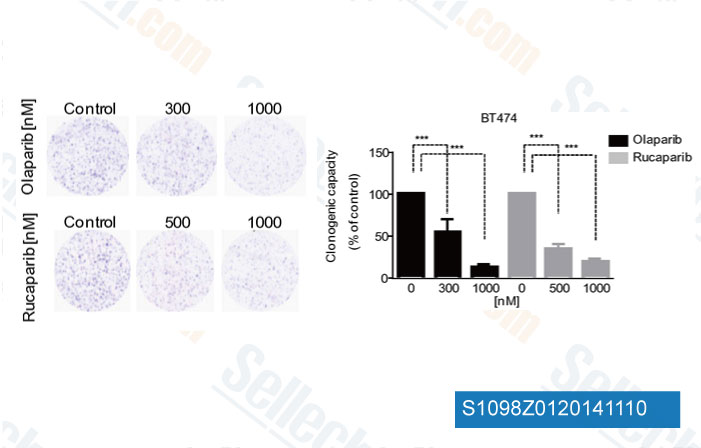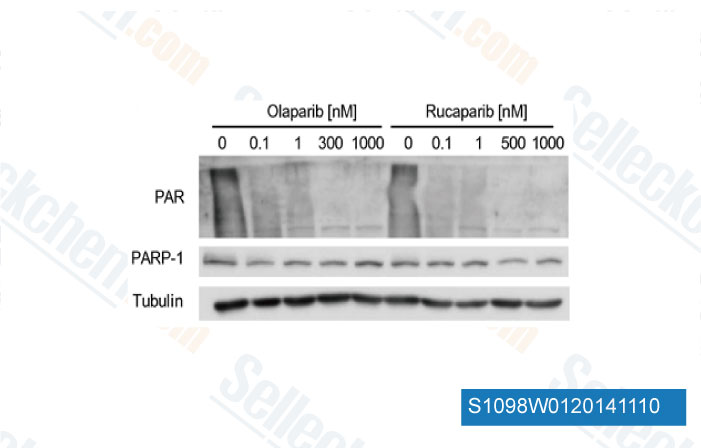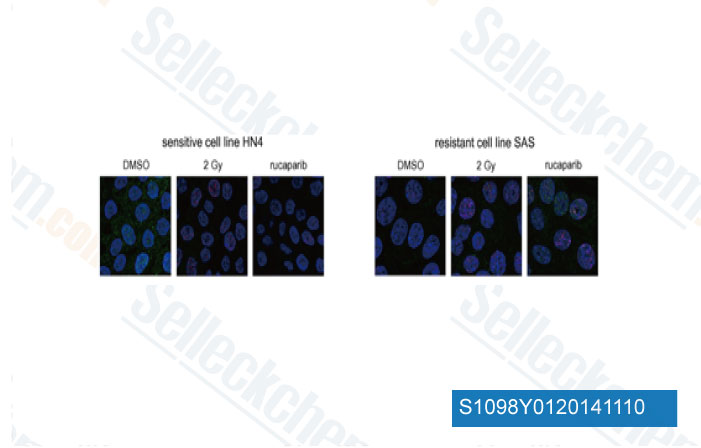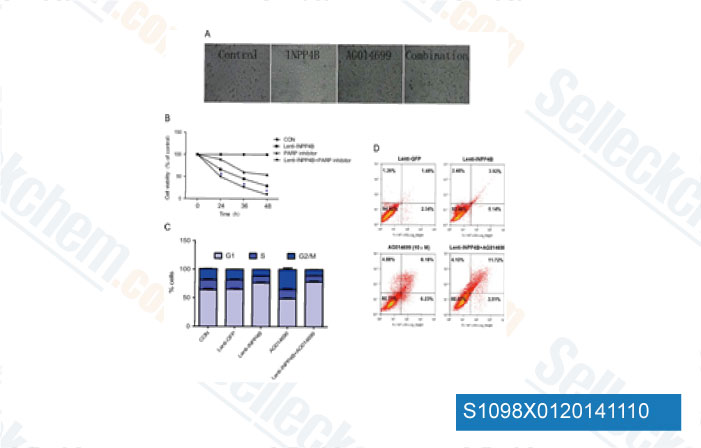|
Toll Free: (877) 796-6397 -- USA and Canada only -- |
Fax: +1-832-582-8590 Orders: +1-832-582-8158 |
Tech Support: +1-832-582-8158 Ext:3 Please provide your Order Number in the email. |
Technical Data
| Formula | C19H18FN3O.H3PO4 |
|||
| Molecular Weight | 421.36 | CAS No. | 459868-92-9 | |
| Solubility (25°C)* | In vitro | DMSO | 85 mg/mL (201.72 mM) | |
| Water | 7 mg/mL (16.61 mM) | |||
| Ethanol | Insoluble | |||
|
* <1 mg/ml means slightly soluble or insoluble. * Please note that Selleck tests the solubility of all compounds in-house, and the actual solubility may differ slightly from published values. This is normal and is due to slight batch-to-batch variations. * Room temperature shipping (Stability testing shows this product can be shipped without any cooling measures.) |
||||
Preparing Stock Solutions
Biological Activity
| Description | Rucaparib phosphate is an inhibitor of PARP with Ki of 1.4 nM for PARP1 in a cell-free assay, also showing binding affinity to eight other PARP domains. Phase 3. | ||
|---|---|---|---|
| Targets |
|
||
| In vitro | Rucaparib is a potent inhibitor of purified full-length human PARP-1 and shows higher inhibition of cellular PARP in LoVo and SW620 cells. Besides, Rucaparib binds detectably to eight other PARP domains, including PARP2, 3, 4, 10, 15, 16, TNKS1 and TNKS2. [1] [2] The radio-sensitization by Rucaparib is due to downstream inhibition of activation of NF-κB, and is independent of SSB repair inhibition. Rucaparib could target NF-κB activated by DNA damage and overcome toxicity observed with classical NF-κB inhibitors without compromising other vital inflammatory functions. [3] Rucaparib inhibits PARP-1 activity by 97.1% at a concentration of 1 μM in permeabilised D283Med cells. [4] | ||
| In vivo | Rucaparib is not toxic but significantly enhances temozolomide-induced TGD in the DNA repair protein-competent D384Med xenografts. Pharmacokinetics studies also show that Rucaparib is detected in the brain tissue, which indicates that Rucaparib has potential in intra-cranial malignancy therapy. [4] Rucaparib significantly potentiates the cytotoxicity of topotecan and temozolomide in NB-1691, SH-SY-5Y, and SKNBE (2c) cells. Rucaparib enhances the antitumor activity of temozolomide and indicates complete and sustained tumor regression in NB1691 and SHSY5Y xenografts. [5] | ||
| Features | The first PARP inhibitor used in clinical trials combined with temozolomide. |
Protocol (from reference)
| Kinase Assay:[1] |
|
|---|---|
| Cell Assay:[4] |
|
| Animal Study:[4] |
|
References
Customer Product Validation

-
Data from [Data independently produced by Eur J Cancer, 2014, 50(15), 2725-34]

-
Data from [Data independently produced by Eur J Cancer, 2014, 50(15), 2725-34]

-
Data from [Data independently produced by Oral Oncol, 2014, 50(9), 825-31]

-
Data from [Data independently produced by Urol Oncol, 2014, 32(5), 720-6]
Selleck's Rucaparib phosphate has been cited by 135 publications
| Uracil processing by SMUG1 in the absence of UNG triggers homologous recombination and selectively kills BRCA1/2-deficient tumors [ Mol Cell, 2025, S1097-2765(25)00098-X] | PubMed: 40010343 |
| PARP inhibitors differentially regulate immune responses in distinct genetic backgrounds of high-grade serous tubo-ovarian carcinoma models [ Cancer Res Commun, 2025, 10.1158/2767-9764.CRC-24-0515] | PubMed: 39851178 |
| Human Fallopian Tube-Derived Organoids with TP53 and RAD51D Mutations Recapitulate an Early Stage High-Grade Serous Ovarian Cancer Phenotype In Vitro [ Int J Mol Sci, 2024, 25(2)886] | PubMed: 38255960 |
| Exosomal miR-664a-5p as a therapeutic target biomarker for PARP inhibitor response in prostate cancer [ Am J Cancer Res, 2024, 14(8):3789-3799] | PubMed: 39267686 |
| CK2-HTATSF1-TOPBP1 signaling axis modulates tumor chemotherapy response [ J Biol Chem, 2024, 300(6):107377] | PubMed: 38762174 |
| BRCA2 Germline Mutations Identify Gastric Cancers Responsive to PARP Inhibitors [ Cancer Res, 2023, 83(10):1699-1710] | PubMed: 37129948 |
| Pharmacological depletion of RNA splicing factor RBM39 by indisulam synergizes with PARP inhibitors in high-grade serous ovarian carcinoma [ Cell Rep, 2023, 42(10):113307] | PubMed: 37858464 |
| The Sensitization of Triple-Negative Breast Cancers to Poly ADP Ribose Polymerase Inhibition Independent of BRCA1/2 Mutation Status by Chemically Modified microRNA-489 [ Cells, 2023, 13(1)49] | PubMed: 38201253 |
| Venadaparib Is a Novel and Selective PARP Inhibitor with Improved Physicochemical Properties, Efficacy, and Safety [ Mol Cancer Ther, 2023, 22(3):333-342] | PubMed: 36808277 |
| Establishment and Molecular Characterization of an In Vitro Model for PARPi-Resistant Ovarian Cancer [ Cancers (Basel), 2023, 15(15)3774] | PubMed: 37568590 |
RETURN POLICY
Selleck Chemical’s Unconditional Return Policy ensures a smooth online shopping experience for our customers. If you are in any way unsatisfied with your purchase, you may return any item(s) within 7 days of receiving it. In the event of product quality issues, either protocol related or product related problems, you may return any item(s) within 365 days from the original purchase date. Please follow the instructions below when returning products.
SHIPPING AND STORAGE
Selleck products are transported at room temperature. If you receive the product at room temperature, please rest assured, the Selleck Quality Inspection Department has conducted experiments to verify that the normal temperature placement of one month will not affect the biological activity of powder products. After collecting, please store the product according to the requirements described in the datasheet. Most Selleck products are stable under the recommended conditions.
NOT FOR HUMAN, VETERINARY DIAGNOSTIC OR THERAPEUTIC USE.
